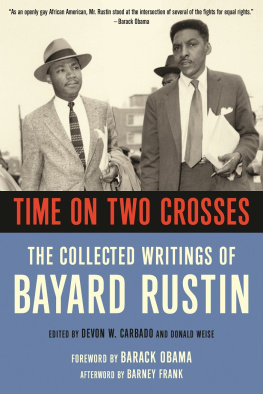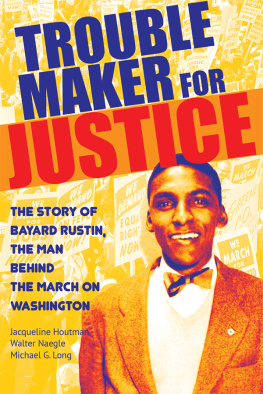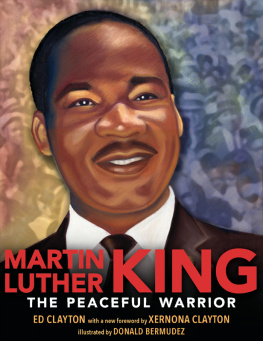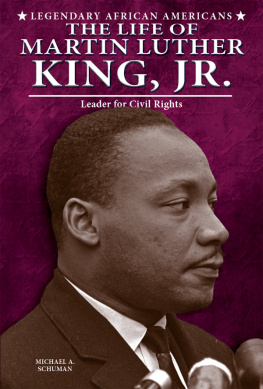TIME ON TWO CROSSES
T HE C OLLECTED W RITINGS OF B AYARD R USTIN
Edited by
D EVON W. C ARBADOandD ONALD W EISE
Foreword by
B ARACK O BAMA
Afterword by
B ARNEY F RANK
Second Edition

Copyright 2015, 2003 by The Estate of Bayard Rustin.
Introduction copyright 2015, 2003 by Devon W. Carbado and Donald Weise.
Foreword copyright 2015 by Barack Obama.
Afterword copyright 2015 by Barney Frank.
All rights reserved. Except for brief passages quoted in newspaper, magazine, radio, television, or online reviews, no part of this book may be reproduced in any form or by any means, electronic or mechanical, including photocopying or recording, or by any information storage or retrieval system, without permission in writing from the publisher.
Cover photo: Rustin with Dr. Martin Luther King, Jr. during the Montgomery Bus Boycott, 1956 (Associated Press/Wide World)
Published in the United States by Cleis Press Inc.,
an imprint of Start Midnight, LLC, 609 Greenwich Street, Sixth Floor, New York, New York 10014.
Printed in the United States.
Cover design: Scott Idleman/Blink
Second edition.
Trade paper ISBN: 978-1-62779-126-8
E-book ISBN: 978-1-62778-143-5
L IBRARY OF C ONGRESS C ATALOGING-IN-PUBLICATION D ATA FOR THE F IRST E DITION
Rustin, Bayard, 19121987.
Time on two crosses: the collected writings of Bayard Rustin/edited by Devon W. Carbado and Donald Weise. 1st ed.
p. cm.
ISBN 1-57344-174-0 (alk. paper)
1. African AmericansCivil rightsHistory20th century. 2. Civil rights movementsUnited StatesHistory20th century. 3. NonviolenceUnited StatesHistory20th century. 4. Social justiceUnited StatesHistory20th century. 5. United StatesRace relations. 6. United StatesSocial conditions20th century. I. Carbado, Devon W. II. Weise, Donald. III. Title.
E185.615.R84 2003
323.1196073dc21 2003007984
A CKNOWLEDGMENTS
T he editors extend a heartfelt thank-you to Walter Naegle and the estate of Bayard Rustin, without whose cooperation, time, and generosity this book would not exist. We also wish to thank David J. Garrow for his expert input.
We would like to acknowledge Rustin biographer John DEmilio (Lost Prophet: The Life and Times of Bayard Rustin), filmmaker Nancy Kates and Bennett Singer (Brother Outsider: The Life of Bayard Rustin), and playwright Brian Freeman (Civil Sex) for their support and camaraderie in the burgeoning field of Rustin scholarship.
A special measure of gratitude is due to Cleis Press publishers Frdrique Delacoste and Felice Newman for their enthusiasm, input, and support, as well as to the sales and marketing team of Publishers Group West.
Further, we are grateful for the research assistance and support of the Hugh and Darling Library at UCLA and the staff of the San Francisco Public Library. We wish also to acknowledge the kind involvement of Richard Deats and the Fellowship of Reconciliation.
Additional thanks to: Kimberle Crenshaw, Dale Frett, Laura Gomez, Mitu Gulati, Cheryl Harris, Akasha Hull, Catherine E. McKinley, Jeff Park, Blanche Richardson, Ina Ross, Jerl Rossi and John Serna, Stewart Shaw, Giovanna Tringali, Jim Van Buskirk, Evelyn C. White, and Mariah Wilkins. And especially to Rene Swindle for her inspiration always.
C ONTENTS
The Making of a Movement
The Politics of Protest
African American Leadership
Equality Beyond Race
Gay Rights
Equality Beyond America
I NTRODUCTION
BAYARD RUSTIN IS REMEMBERED as a consummate civil rights strategist and humanitarian whose staunch advocacy of nonviolent resistance shaped the course of social protest from the 1960s through the close of the twentieth centuryand even up to protest movements of today. First as political adviser to Martin Luther King, Jr., in the 1950s and later as organizer of the 1963 March on Washington, Rustin defined the black protest agenda to an extent that few activists had done before himor would do even after his death in 1987. It was Rustin who helped introduce nonviolent direct action to the civil rights movement, and if he was remembered for nothing more than this, his reputation would be enshrined in African American history. But he was also well-placed among the power brokers of organized labor and the Democratic Party, to say nothing of world leaders like Kwame Nkrumah, Lyndon Johnson, and Golda Meir. Few African Americans engaged in as broad a protest agenda as did Rustin; fewer still enjoyed his breadth of influence in virtually every political sector of American life.
Nevertheless, Rustin remained an outsider in black civil rights circles for much of his life. He was openly gayand that he was black in addition created a seemingly unprecedented conundrum for African American leaders, who weighed the worth of his tactical expertise and political sophistication against his deviant sexual identity. Sometimes his expertise and sophistication won out. At other times, the perceived political cost of his homosexuality outweighed his value to the movement. In these instances, he was dismissed, asked to resign from service, or denied a platform to voice his concerns. Up until quite recently, before the first Rustin biographies appeared in the 1990s, civil rights historians dealt with himwhen they have chosen to include him at allas a sideline activist whose principal purpose was to support King and the movement. Perhaps no other figure contributed so much to the civil rights movement yet has been so heavily penalized by it.
Rustins own point of view in his writings is often outward looking, as if to deflect attention from himself as a man. Given that he came of age under Jim Crow laws and spent much of his life working on behalf of religious-based social protest groups, his reticence around disclosing his true personal feelings, or coming out, is understandable. Time on Two Crosses serves the doubly vital function not only of restoring Rustins voice to the historical record, but also of refocusing attention on the man himself.
Time on Two Crosses is the first comprehensive collection of Bayard Rustins writings ever published, comprising forty-eight essays, speeches, and interviews, many of which were never widely available. From the birth of nonviolent direct action to the rise of Black Power, Rustins writings function as a road map for the meandering course of black protest movements over the past century.
It is impossible to understand the manhis ideological commitments, his political activism, his institutional affiliationswithout considering his time on two crosses: that is, how his race and sexuality shaped his political life, nurtured and sustained his indomitable spirit, and helped him to conceive of civil rights as a struggle for the human family. As he reminds us, [O]ne has to fight for justice for all. If I do not fight bigotry wherever it is, bigotry is thereby strengthened. And to the degree that it is strengthened, it will thereby have the power to turn on me.
Bayard Rustin was born in West Chester, Pennsylvania, in March 1912. His mother, Florence Rustin, was sixteen years old and unmarried at the time of his birth. His father, Archie Hopkins, broke off relations with Florence during her pregnancy, never to see his son. Abandoned and unprepared to care for her child, Florence turned to her parents, Julia and Janifer Rustin. The Rustins were a politically progressive, middle-class couple active in the African Methodist Episcopal (AME) Church. Although they were already the parents of eight children, they chose to adopt the infant, naming him Bayard Taylor Rustin. As one of Bayards sisters recalled, At first my mother said, Oh, Im just going to let Florence raise that baby by herself. But one day when she looked down at him in his crib, he smiled up sweetly at her. She decided then and there that Florence could not be a suitable parent, that she would take the baby and raise him properly. To spare him embarrassment, the Rustins concealed from Bayard until adolescence the truth that they were not his parents but in fact his grandparents.
Next page







